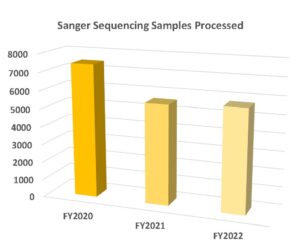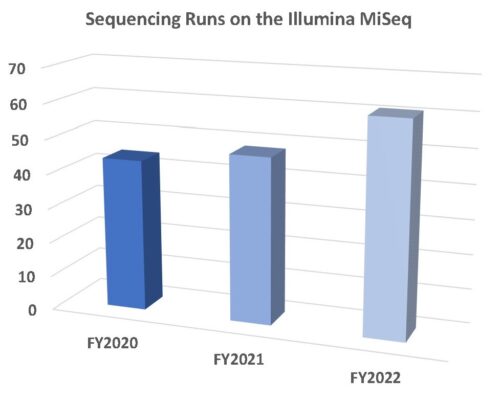Molecular Informatics Core Update 
Summer 2023
- Completion of Cloud-Based Learning Module and Launch of NIGMS Sandbox
Last year the MIC received an administrative supplement to the RI-INBRE grant to complete a cloud-based training module for NIGMS. The completed module, A Cloud-Based Learning Module for Biomarker Discovery (CBLMBD), launched in July with 11 other educational modules as part of the new NIGMS Sandbox. The Sandbox modules cover a variety of topics in biomedical data science including RNA-seq, proteomics, single cell ATAC-seq, and more. Manuscripts for each module will be published soon as a special issue of Briefings in Bioinformatics. Dr. Hemme presented the MIC module at the Sandbox launch and at the Northeast Regional IDeA Conference (NERIC) in August. Students and researchers interested in using the modules can follow the instructions for each module or contact Dr. Hemme (hemmecl@uri.edu) for assistance.
Learn more about the CBLMBD Award - Virtual Reality Applications
For the past several years, the MIC has collaborated with the URI ITS Innovative Learning Technologies group and faculty in the College of Pharmacy to develop virtual and augmented reality apps for use in the College of Pharmacy curriculum. The value of VR became clear during the COVID lockdowns as the VR equipment allowed us to conduct virtual training in topics such as structural biology. We recently published a manuscript entitled “Developing virtual and augmented reality applications for science, technology, engineering and math education” in Biotechniques (July 2023. PMID37291856). The VR/AR/MR app depository is at GitHub. Dr. Hemme and Roy Bergstrom from ILT will be presenting the apps at the EDUCAUSE conference in October.
- Biomedical Data Science in Rhode Island
The MIC recently partnered with the Advance-CTR Biomedical Informatics, Bioinformatics, and Cyberinfrastructure Enhancement (BIBCE) Core to chair a panel on The Biomedical and Health Data Science Ecosystem in Rhode Island at the Rhode Island IDeA Symposium in June. The panel included six Rhode Island data scientists working on a variety of research projects. Following this panel session, the organizers, participants and other interested parties are working on follow-up meetings and cooperative training opportunities to serve the data science needs of the Rhode Island research community.
Winter 2023
- Sequencing Center
It has been a year and a half since the merger of the University of Rhode Island’s (URI) Genomics and Sequencing Center (GSC) with the RI-INBRE Bioinformatics Core to form the RI-INBRE Molecular Informatics Core (MIC), we have closely monitored usage to ensure that we are providing sufficient services to our customers.Our two primary services are the Illumina MiSeq for short-read next-gen sequencing (NGS) and traditional Sanger sequencing. We are happy to report that the GSC retained the majority of its customer base following the move and demand for sequencing services has remained steady and even grown in FY2022 for NGS services. Our goal for the future is to continue providing the services our users need and to explore upgrading our sequencing capacity and adding recent technologies for single-cell and spatial omics work.


-
Software and Hardware Updates
URI is continuing to upgrade its high-performance computing (HPC) capacity. The old Bluewaves server is being retired in favor of the newer Andromeda system. URI has also joined the Massachusetts Green High-Performance Computing Center (MGHPCC) allowing the university access to the MGHPCC Unity cluster. Primarily undergraduate institution investigators needing HPC services may request affiliate status with URI through RI-INBRE.
The MIC has retired the Adobe Creative Cloud license as it is now available at URI and other institutions. Please contact the MIC if you have any software needs.
Summer 2022
- The MIC works to integrate the sequencing and bioinformatics components to provide users with a unified sample to analyze pipelines designed to meet the users’ needs. These pipelines include help with experimental design, sample preparation, sequencing, bioinformatics pipeline construction, and data analysis and visualization. Users are encouraged to contact the MIC for a consultation. July 1, 2022, marked the one-year anniversary of the new MIC core’s sequencing services.
